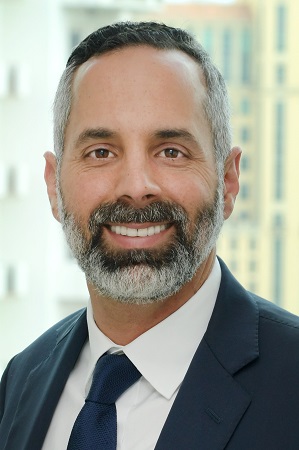By Vanessa Orr
It is difficult enough to be faced with a disability, and it’s even more challenging when the person dealing with the disability has to pursue a case against an insurance company to get the benefits they deserve. For the past 20 years, Dabdoub Law Firm, a nationally recognized disability insurance law firm headquartered in Coral Gables, has been helping clients, including physicians, through the maze that is the disability legal field.
“The biggest hurdle for our clients is knowing how to navigate the process with the insurance company; it’s extremely cumbersome,” explained founder and attorney Edward Dabdoub. “In many of these cases, federal law governs the process of submitting a claim for disability benefits to insurance companies, and there’s an entire appeals process that the client has to go through with the insurance company that denied the claim before they can even file a lawsuit.
“Most attorneys don’t even understand how that process works, much less a layperson or a person struggling with a physical or cognitive disability,” he added. “On the other hand, the insurance company is very well aware of the process and what should be done. There’s very little transparency in any of this.”
He adds that disability claims can be especially difficult to win for physicians, as most insurance companies either don’t understand or refuse to understand the unique nature of the physician’s occupation.
“Especially in a surgical practice, for example, instead of looking at how important certain procedures are to the occupation as a whole, the insurance company analyzes CPT billing code information and makes decisions on the importance of these duties based on a cold mathematical review while ignoring the qualitative importance of duties that define these medical specialties,” said Dabdoub.
He gives the example of a recent case in which he represented one of the top liver transplant surgeons in the country who had a wrist injury that made the surgeon unable to perform liver surgeries longer than five hours, though he was able to continue teaching and performing some other surgeries. Because the plaintiff was able to perform other aspects of his job, the insurance company denied his claim for total disability coverage.
“There are certain procedures that are so unique that they define that physician’s occupation even if those procedures are not done in volume,” said Dabdoub, who won the case, providing the client with full coverage for his disability. “For physicians especially, you cannot get more granular than that in terms of the type of attorney you need; finding someone who understands the medical specialty and how to present the occupation in order to win these cases.”
In addition to seeking out an attorney who specializes in handling physician disability insurance claims, Dabdoub also advises doctors to make sure that any attorney they are vetting has won these types of cases in court.
“That’s how you figure out who the real McCoys are,” he said. “The majority of disability cases settle out of court, in part because that’s the business model that insurance companies follow. They deny a bunch of claims, then settle the majority of them if they’re going to end up in court.
“They still don’t end up paying out 100 percent of what they owe,” he added. “And that’s where having the right attorney comes in. This is a very niche, small practice area, and all of the attorneys on the plaintiff side and defense side know each other. If the defense attorney knows that the plaintiff’s attorney isn’t going to litigate or win, it will drive down the settlement percentage.”
If an attorney has a reputation for winning these types of cases, it changes the calculus for the insurance company. “They will put more money on the table to avoid the alternative of having to deal with a plaintiff’s attorney who will try and win the case,” said Dabdoub.
No matter what the profession, Dabdoub suggests that those who have disability claims call an attorney as quickly as possible.
“The sooner you call, the better,” he says. “Successful disability claims—those that get approved—are the ones where we prepare ahead of time even before the person stops working. Far too often, we get a call from someone who stopped working a year ago and the insurance company is dragging things out with a barrage of requests, and now the person has decided to get legal advice.
“For physicians especially, do not start changing your practice without consulting an attorney that specializes in this area,” he added. “You may unintentionally redefine your occupation.”
For more information, visit www.longtermdisability.net or call 1-888-812-0393.



























